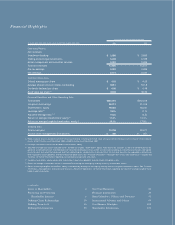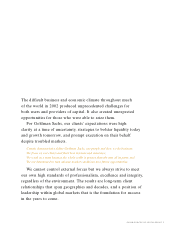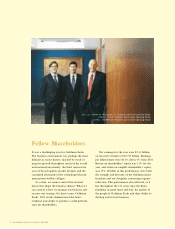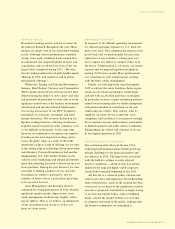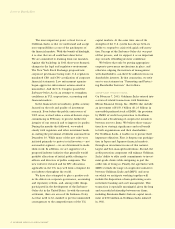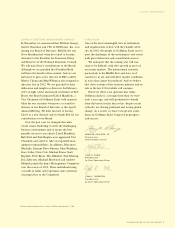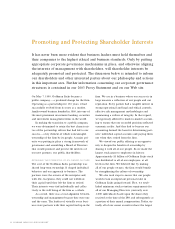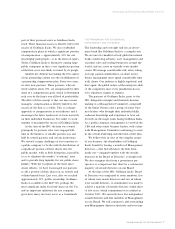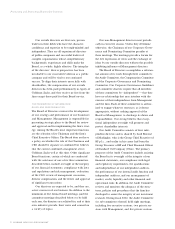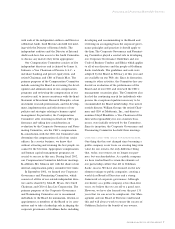Goldman Sachs 2002 Annual Report Download - page 5
Download and view the complete annual report
Please find page 5 of the 2002 Goldman Sachs annual report below. You can navigate through the pages in the report by either clicking on the pages listed below, or by using the keyword search tool below to find specific information within the annual report.
GO LDMAN SA CH S 2002 A N N UA L R EPO RT 3
BUSINESS RESULTS
Investment banking activity and net revenues for
the industry declined throughout the year. Those
declines are clearly seen in our investment banking
results, although relative performance remained
strong. Once again, Goldman Sachs ranked first
in announced and completed global mergers and
acquisitions, and we advised on seven of the ten
largest deals completed during 2002.(1) We were
also the leading underwriter of global public equity
offerings in 2002, and ranked second in global
initial public offerings.(1)
Within our Trading and Principal Investments
business, Fixed Income, Currency and Commodities
(FICC) produced record net revenues for the firm,
demonstrating the ability to serve clients and take
risk prudently. In particular, we were able to avoid
significant credit losses as the business environment
deteriorated and spreads widened. Performance
was strong across most of our FICC businesses,
particularly in currencies, mortgages and fixed
income derivatives. Net revenues declined in our
Equities trading business, reflecting weaknesses
in global equities markets in what continues to be
a very difficult environment. At the same time,
however, we continued to strengthen our equities
franchise in the most important trading centers
across the globe. And, as a result of the fuller
integration of Spear, Leeds & Kellogg, we are truly
at the cutting edge of technology-driven innovation
and efficiency. Principal Investments had another
disappointing year, with further declines in the
value of several technology and telecom investments
more than offsetting favorable results from the real
estate portfolio. During the year, however, we were
successful at finding a number of very attractive
investments in which to participate, and we
continue to believe this is a particularly good time
to be an active investor.
Asset Management and Securities Services
continued its strong performance in 2002. Despite
significant equities market depreciation, assets
under management declined only slightly, reflect-
ing net inflows. This is, we believe, an affirmation
of our investment track record as well as our
focus on client service.
MANAGEMENT DISCIPLINE
In response to the difficult operating environment,
we reduced operating expenses by 11% from the
prior year’s level. Non-compensation expenses were
pared back and we made painful but necessary
reductions to our workforce, taking great care
not to impair our ability to compete today or in
the future. Compensation is, of course, our largest
expense and we imposed rigorous discipline in
making 2002 bonus awards. Most professionals
saw reductions in total compensation, starting
with the firm’s senior management.
Finally, we took important steps throughout
2002 to refocus the entire Goldman Sachs organi-
zation on our business principles, which begin
and end with an absolute insistence on integrity.
In particular, we have a major continuing initiative
aimed toward insuring that we exhibit unimpeach-
able professionalism in everything we do and
reinforcing our culture. That culture, with its
emphasis on client service, teamwork, strict
compliance and excellence, is our greatest strength,
but it requires constant reinforcement, particularly
in difficult markets and under adverse conditions.
Safeguarding our culture will continue to be one
of our highest priorities in 2003.
RESTORING INVESTOR CONFIDENCE
The continuing after-effects of the late 1990s
technology/telecommunications bubble posed sig-
nificant challenges to the financial markets and
our industry in 2002. The huge losses associated
with the bubble’s collapse severely affected
investor confidence—which in turn was further
shaken by the large and highly visible corporate
scandals that emerged beginning in late 2001.
All this led to a storm of public criticism and
calls for new laws and regulations. Notwithstanding
some of the rhetoric, much of the criticism has been
warranted, as are many of the regulations recently
enacted or proposed. And while it is simply wrong
to say that investment banks, such as Goldman
Sachs, created the market bubble, it is true that,
in common with much of the media, academia and
the business community, we misjudged it.
Letter to Shareholders


